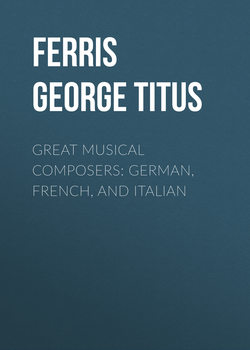Читать книгу Great Musical Composers: German, French, and Italian - Ferris George Titus - Страница 8
HANDEL
VI
ОглавлениеThe period of Handel’s highest development had now arrived. For seven years his genius had been slowly but surely maturing, in obedience to the inner law of his being. He had struggled long in the bonds of operatic composition, but even here his innovations showed conclusively how he was reaching out toward the form with which his name was to be associated through all time. The year 1739 was one of prodigious activity. The oratorio of “Saul” was produced, of which the “Dead March” is still recognised as one of the great musical compositions of all time, being one of the few intensely solemn symphonies written in a major key. Several works now forgotten were composed, and the great “Israel in Egypt” was written in the incredibly short space of twenty-seven days. Of this work a distinguished writer on music says – “Handel was now fifty-five years old, and had entered, after many a long and weary contest, upon his last and greatest creative period. His genius culminates in the ‘Israel.’ Elsewhere he has produced longer recitatives and more pathetic arias; nowhere has he written finer tenor songs than ‘The enemy said,’ or finer duets than ‘The Lord is a man of war;’ and there is not in the history of music an example of choruses piled up like so many Ossas on Pelions in such majestic strength, and hurled in open defiance at a public whose ears were itching for Italian love-lays and English ballads. In these twenty-eight colossal choruses we perceive at once a reaction against and a triumph over the tastes of the age. The wonder is, not that the ‘Israel’ was unpopular, but that it should have been tolerated; but Handel, while he appears to have been for years driven by the public, had been, in reality, driving them. His earliest oratorio, ‘Il Trionfo del Tempo’ (composed in Italy), had but two choruses; into his operas more and more were introduced, with disastrous consequences; but when, at the zenith of his strength, he produced a work which consisted almost entirely of these unpopular peculiarities, the public treated him with respect, and actually sat out three performances in one season!” In addition to these two great oratorios, our composer produced the beautiful music to Dryden’s “St. Cæcilia Ode,” and Milton’s “L’Allegro” and “Il Penseroso.” Henceforth neither praise nor blame could turn Handel from his appointed course. He was not yet popular with the musical dilettanti, but we find no more catering to an absurd taste, no more writing of silly operatic froth.
Our composer had always been very fond of the Irish, and, at the invitation of the lord-lieutenant and prominent Dublin amateurs, he crossed the channel in 1741. He was received with the greatest enthusiasm, and his house became the resort of all the musical people in the city of Dublin. One after another his principal works were produced before admiring audiences in the new Music Hall in Fishamble Street. The crush to hear the “Allegro” and “Penseroso” at the opening performances was so great that the doors had to be closed. The papers declared there never had been seen such a scene before in Dublin.
Handel gave twelve performances at very short intervals, comprising all of his finest works. In these concerts the “Acis and Galatea” and “Alexander’s Feast” were the most admired; but the enthusiasm culminated in the rendition of the “Messiah,” produced for the first time on 13th April 1742. The performance was a beneficiary one in aid of poor and distressed prisoners for debt in the Marshalsea in Dublin. So, by a remarkable coincidence, the first performance of the “Messiah” literally meant deliverance to the captives. The principal singers were Mrs. Cibber (daughter-in-law of Colley Cibber, and afterwards one of the greatest actresses of her time), Mrs. Avoglio, and Mr. Dubourg. The town was wild with excitement. Critics, poets, fine ladies, and men of fashion tore rhetoric to tatters in their admiration. A clergyman so far forgot his Bible in his rapture as to exclaim to Mrs. Cibber, at the close of one of her airs, “Woman, for this be all thy sins forgiven thee.” The penny-a-liners wrote that “words were wanting to express the exquisite delight,” etc. And – supreme compliment of all, for Handel was a cynical bachelor – the fine ladies consented to leave their hoops at home for the second performance, that a couple of hundred or so extra listeners might be accommodated. This event was the grand triumph of Handel’s life. Years of misconception, neglect, and rivalry were swept out of mind in the intoxicating delight of that night’s success.
